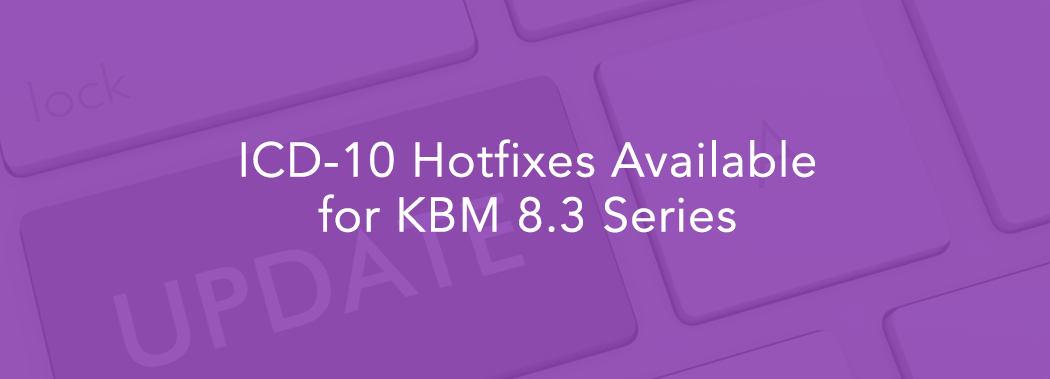We’re ready and willing, to help our NextGen® Ambulatory Knowledge Base Model (NextGen® KBM) 8.3 series clients succeed with ICD-10. This article provides instructions to access our newly-available hotfixes for the NextGen Ambulatory KBM 8 series – versions 8.3.0 through 8.3.10. There is no charge for your Ambulatory KBM 8.3 series hotfix whether you download and self-install or ask us to do it for you.
This hotfix must be applied by any NextGen Healthcare client using any 8.3 series Ambulatory KBM version. This hotfix is cumulative: It includes all corrections issued in previous 8.3 series Ambulatory KBM hotfixes plus the current set of hotfixes all NextGen Ambulatory KBM 8.3 series clients must have to remain ICD-10 compliant.
Instructions to access Ambulatory KBM 8.3 Series ICD-10 hotfixes:
NOTE: To avoid confusion when accessing Knowledge Exchange (KE) links please log into KE first, before you access the KE links mentioned in this article.
The above link will take you directly to the list of ICD-10 hotfixes for each version in the NextGen Ambulatory KBM 8 series platform. Each hotfix is ready to download and self-install from Knowledge Exchange.
– or –
If you prefer, open a support incident/request to have NextGen Healthcare client support apply your hotfix – at no cost. A new support incident/request can be opened at the top left hand corner of the Service Desk Express (SDE) home page.
- In the “Support Ticket Subject” please input: KBM Upgrade Request
- In the “Incident Description” box below please input: Need ICD-10 Hotfix installed
If you previously opened a support ticket and are on the Hotfix Waitlist, you do not need to open another ticket. Support will contact you based on the Waitlist queue.
There is no charge for these hotfixes – whether you download and install them yourself, or you ask NextGen Healthcare to do it for you.
Additional support and resources for this KBM ICD-10 hotfix
Documentation covering this ICD-10 hotfix for Ambulatory KBM versions 8.3.0 through 8.3.10 is available here, under the “Hot Fix Resources” section of the “ICD-10 Industry Links and Resources” section of Knowledge Exchange. It includes details for clients who have previously customized templates and want to make ICD-10 fixes themselves.
Clients on the 5.8 “base version” (5.8.0.106) of our EHR/PM core application can expect the ICD-10 hotfix for that version on August 3, 2015.
An ICD-10 Transition Tool Kit is also available. It allows you to:
- Identify where ICD-9 codes still exist
- Enable the Interceptor code in your Test Database
- Update the Diagnosis Code on pending Immunization Orders that span the compliance date
- Update the Patient Diagnosis History with ICD-10 codes if the Dual Coding functionality was enabled
Complete documentation for the Transition Tool Kit is here.
New ICD-10 Services Catalog and other updated resources
For additional ICD-10 readiness assistance, clients should review our new ICD-10 Services Catalog. It contains a complete listing of complimentary offerings and fee-based services. Clients also should visit the Links and Resources page in Knowledge Exchange because we’ve posted new updates to the ICD-10 Implementation Checklist, a new ICD-10 Readiness Audit, and other helpful, new documentation.
Ambulatory KBM 8.3 series clients: We’re here, ICD-10 ready
NextGen Ambulatory KBM 8.3 series clients needing any kind of help during the final months leading up to ICD-10 should email our experts at upgradeservices@nextgen.com. We’re here to help you succeed with your ICD-10 transition.
SPECIAL NOTE REGARDING CMS and AMA ANNOUNCED STEPS TO EASE ICD-10 TRANSITION:
Your ICD-10 claims and quality reporting responsibilities have not been reduced by the recent CMS and AMA announcement to ease the strictness of ICD-10 reporting for the first 12 months after the October 1 transition date. During this period, Medicare claims will not be denied provided you use an ICD-10 code from the right family of ICD-10 code sets, even if the specific code you select from that family is incorrect. A similar loosening, for one year, of full and correct ICD-10 coding specificity for quality reporting also is part of the recent CMS/AMA announcement – details of which can be found here.
We strongly urge all NextGen Healthcare clients to maintain, and where needed, increase preparations to properly handle ICD-10 right from the start – October 1, 2015. Doing it right, right now, will save you and your practice from weeks and even months of potential ICD-10 remediation later on. That remediation could cost you and your practice significantly in lost hours of productivity and claims repayments back to CMS.
NextGen Healthcare Upgrade Services thanks you for your continued support

